<div id=”link_wrapped_content”>
Expert’s Rating
Pros
- Very cheap lifetime plan
- 24/7 live chat support
- Audited no-logs policy
Cons
- Not many servers
- Fire TV Stick app has to be sideloaded
- Browser extensions are misleading
Our Verdict
FastestVPN unblocks some of the most popular streaming services and has an audited no-logs policy. We saw some decent speeds using WireGuard and although the apps aren’t the slickest and aren’t exactly packed with features, it’s a bargain for some people at $40.
Price When Reviewed
From $1.11 (approx 83p) per month (10 devices)
Best Prices Today: FastestVPN
Fast Technology Ltd.
£0.83
Using superlatives in your company name is a bold strategy, especially when that name is FastestVPN. When we last reviewed the service towards the end of 2022, we remained unimpressed overall.
However, seven months later, the company contacted us to say they’ve been working hard to address our criticisms. One important thing was to get an independent audit that showed it really does stick by its no-logs policy, and the other was to roll out the WireGuard protocol for faster speeds.
So, do these improvements make FastestVPN worthy of your shortlist?
In short, yes. While the VPN service doesn’t rival the best – such as NordVPN – overall, there’s still enough here to make it attractive to some people.
The biggest attraction is still the price. FastestVPN is one of few vpn services that offers a lifetime subscription. It’s now twice as expensive as it used to be, but at just $40 it’s still a bargain. That’s less than a lot of rivals charge for a single year.
A lifetime subscription is exactly what it sounds like: you pay once and can use the service for the foreseeable future.
It sounds like a scam, but it isn’t. Obviously there are no guarantees the company will be around to provide the service in 10 years’ time, but at this price, you can’t really lose.
To be precise, you can’t lose if FastestVPN does the things you want it to. And to find out if it does, read on.
FastestVPN is one of few VPN services that offers a lifetime subscription
Features
- Servers in 39 countries
- Double VPN (three options)
- 6 P2P servers
- Streaming-optimised servers in 7 countries
FastestVPN has a relatively small number of servers compared to NordVPN, CyberGhost and others. There are around 100 which are spread across 39 countries and 55 locations. 10 of these are in the USA in various states, with a number in Sweden, Netherlands, Switzerland and then just a single server in many other countries. The UK and Japan have two apiece.
There is a server in India, but it’s marked as virtual. The laws in India now force VPNs to log user data which is why a lot of VPN services have pulled their Indian servers and offer only virtual Indian locations, if at all. FastestVPN told us that the Indian server is actually located in the Cayman Islands, where the company is headquartered.
P2P is supported on just a few servers – in Finland, Portugal and Germany – and there are seven streaming-optimised servers in Korea, Japan, India, USA, UK, Canada and Italy.
Jim Martin / Foundry
The D-VPN means double VPN. And that, in case you’re still none the wiser, means it routes your connection via two VPN servers instead of one, adding another layer of protection. However, there are only three options currently: France via UK, Germany via Spain, and UK via USA.
The biggest drawback of having a small number of servers is the risk of them being overloaded. And because the apps don’t indicate how ‘full’ or busy each location is, you’ll only know there’s a problem when you get slow connection speeds.
With other VPN services that have many servers at each location, there’s less of a chance of this happening.
Apps
When it comes to apps, FastestVPN offers them for Windows, Mac, Android and iOS. It lists many more devices, such as Apple TV, Roku and games consoles, but this is misleading: it’s possible to run a VPN on many of those devices only if you can configure your router to use a VPN, which also means all your home devices run via the VPN, which isn’t something most people will want to do, and not something all routers support.
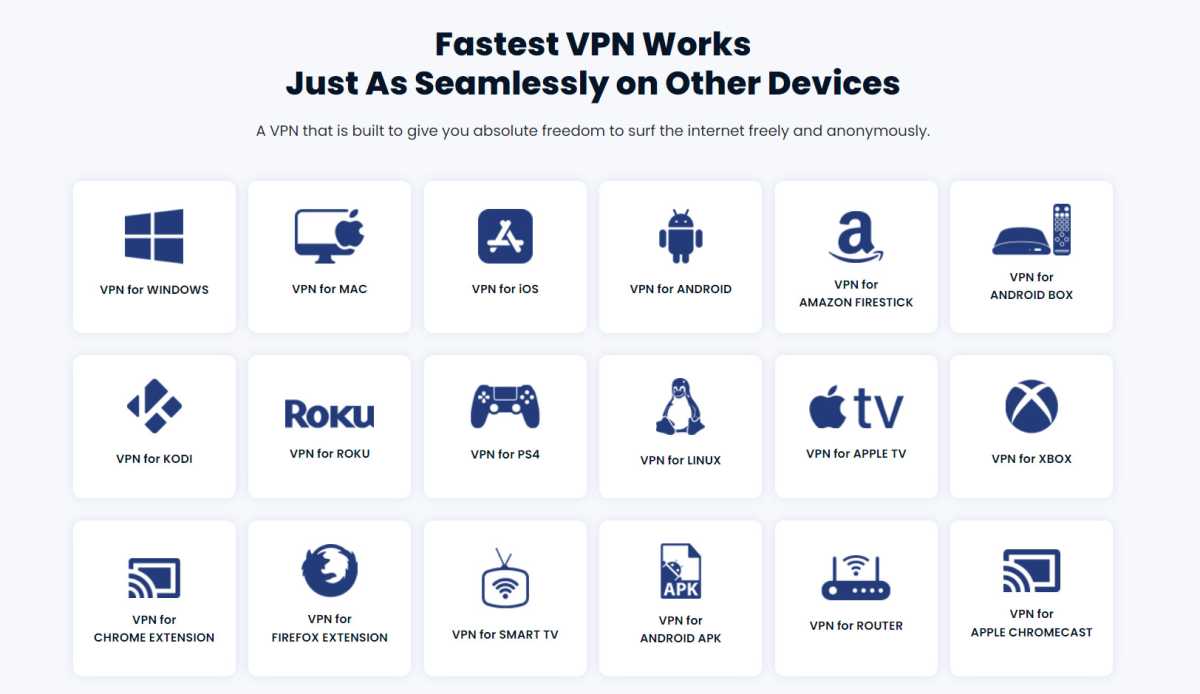
Jim Martin / Foundry
The Amazon Firestick app isn’t available in the app store on the device, which is a pain. Instead you have to side-load the Android APK by first installing the Downloader app. That’s inconvenient and something you don’t have to do with NordVPN, Surfshark and others.
There’s support for various Linux distros, but only via the command line: there’s no graphical interface.
The Amazon Firestick app isn’t available in the app store on the device, which is a pain
It’s also misleading to call the Chrome and Firefox extensions ‘VPN for…’ because these are proxy services, not VPNs.
The Firefox extension is a little clearer about this fact in its description, but calls itself “FastestVPN Proxy – Free VPN for an Unrestricted and Secure Internet Experience“. It isn’t free, and it isn’t a VPN.
The Chrome extension is called FastestVPN Proxy for Chrome, but the description misleadingly says,
“FastestVPN is built on the cutting-edge VPN technology to deliver unmatched security and performance.
Hailing from the Cayman Islands, you can be sure that your activities will be remain anonymous. This Chrome VPN extension comes with a zero-log policy and stands by its commitment to user privacy.”
It then talks about VPN another half-dozen times. Most users would assume that their activity in Chrome would have the same level of protection as using the VPN app, but in fact a proxy service does not encrypt all data in the same way, and sometimes not at all.
We’re always disappointed when we see VPN services claiming to make your activity anonymous.
The apps will automatically select the best protocol by default, but it doesn’t tell you which one it’s using. If you want to be certain it’s using WireGuard, you need to select that manually in the settings.
All the apps have a similar design (except Linux, of course) so it’s easy to switch between devices and see a familiar interface.
The mobile apps have been developed the furthest, although even now they’re only just getting features rivals have always had in their apps, such as the ability to add favourite servers. It’s nice that you can long-press on a country to see specific locations and these are ordered by ping so you can tap on the first to get what should be the fastest speeds.
Windows
We last looked at FastestVPN in November 2022, and found quite a few issues with the Windows app. Those has mostly been resolved, and the installer no longer throws up a warning because it didn’t have a valid digital signature.
It does, annoyingly, still cause a Windows PowerShell popup every time you launch the app, which asks you if it’s ok for the app to make changes to your system. This is another thing that FastestVPN needs to address, because other VPN apps don’t do this and, even for people who more technically knowledgeable, it’s still a worrying message that can make you feel uneasy about exactly what it’s doing.
The app is far from the best around, but it is fairly straightforward to use and there’s now a Favourites tab for servers you connect to regularly. To add a favourite you need to click the tiny, unintelligible icon next to the server name. Look closely and you’ll spot it’s a grey heart with a line through it: this becomes a red heart once you’ve clicked it, and the server then appears in the Favourites section.
Unlike the mobile apps, you can’t see each server’s ping. There’s no way to tell how busy each one is in any of the apps.
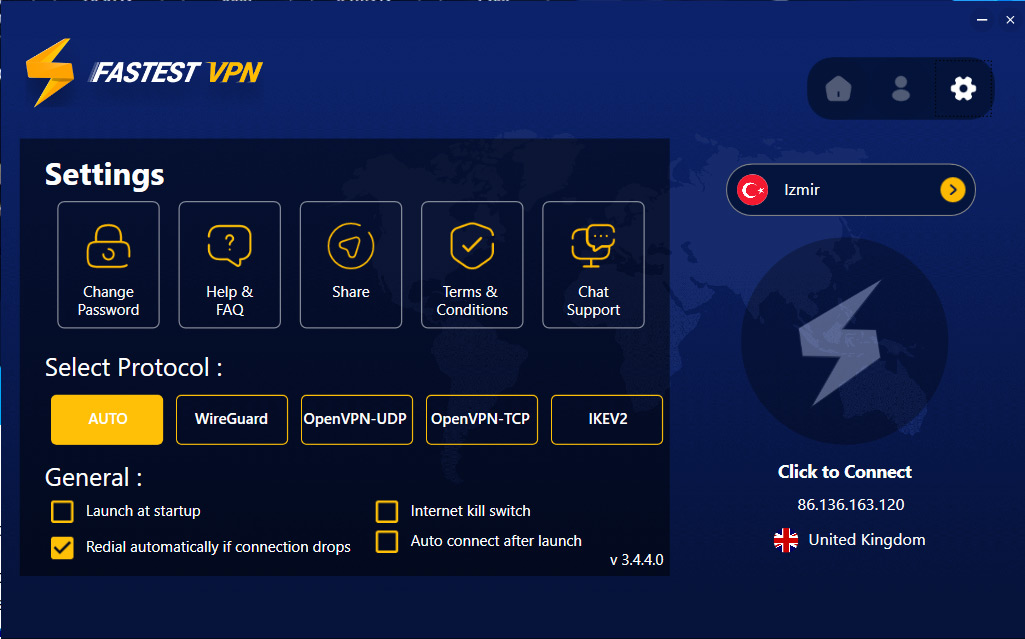
Jim Martin / Foundry
Overall, there aren’t loads of features. The company’s website says there’s malware protection and ad-blocking, but you won’t see any mention of this in the apps, including the Windows version. And there was no evidence that any ads were being blocked while we used the service.
You can get the app to auto-launch with Windows and auto connect to the VPN. But there are no settings to specify which server it should connect to, no auto connect when your device joins an unknown or unsecured Wi-Fi network, no split tunnelling and no advert or tracker blocker that a lot of rivals have.
The kill switch, which is off by default, is just a tick box: it’s on or off. When it’s triggered, it displays a pop-up to ask if you want to reconnect to the VPN or resume internet connectivity. Those are confusingly worded, as the latter means “use the internet without a VPN”, but it’s better than no notification at all. With some other VPNs, you’re left with no internet access and no idea why.
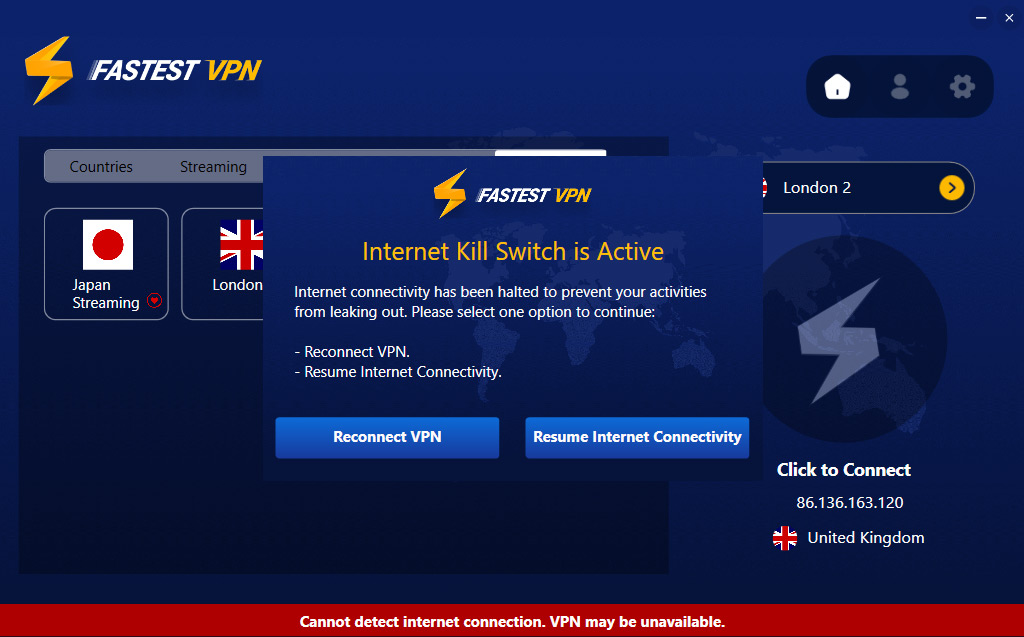
Jim Martin / Foundry
Android and iOS apps
The two apps use an identical interface but as with all VPNs the Android version gets a bigger helping of features. Not many, mind you. It has split tunnelling, letting you choose which apps use the VPN and which don’t, and a kill switch.
On an iPhone there’s Smart Tunneling which “enables VPN protection for added domains even when the app is not open”. You have to add each website manually, and there’s no way to choose (as with split tunnelling) which apps do and don’t use the VPN.
There are three tabs, with the same options in each.
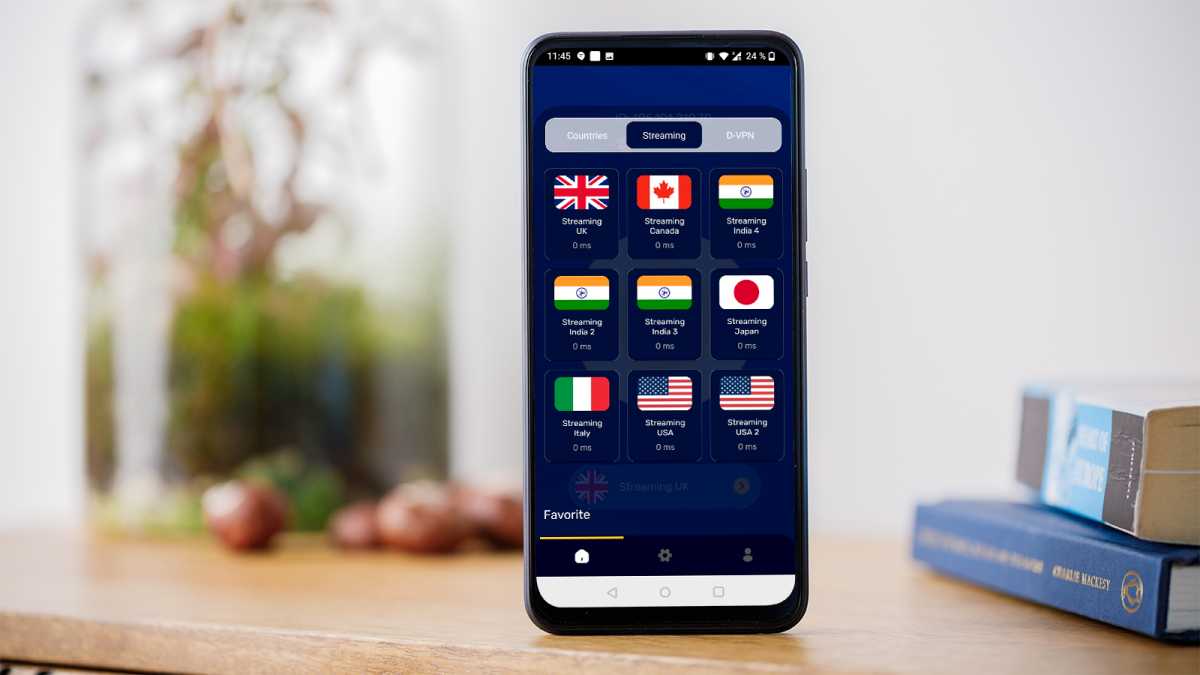
Dominik Tomaszewski / Foundry
The iPhone app is trickier to use. Its interface uses a mixture of back buttons and sliding pop-ups, which you have to slide downwards to go back. The issue is that it’s not always obvious when you’re looking at a pop-up, leaving you searching for a non-existent back button.
It isn’t the slickest: some of the text is very small and sometime text cuts off so you can’t see, for example, which server is used for the Germany double-VPN connection.
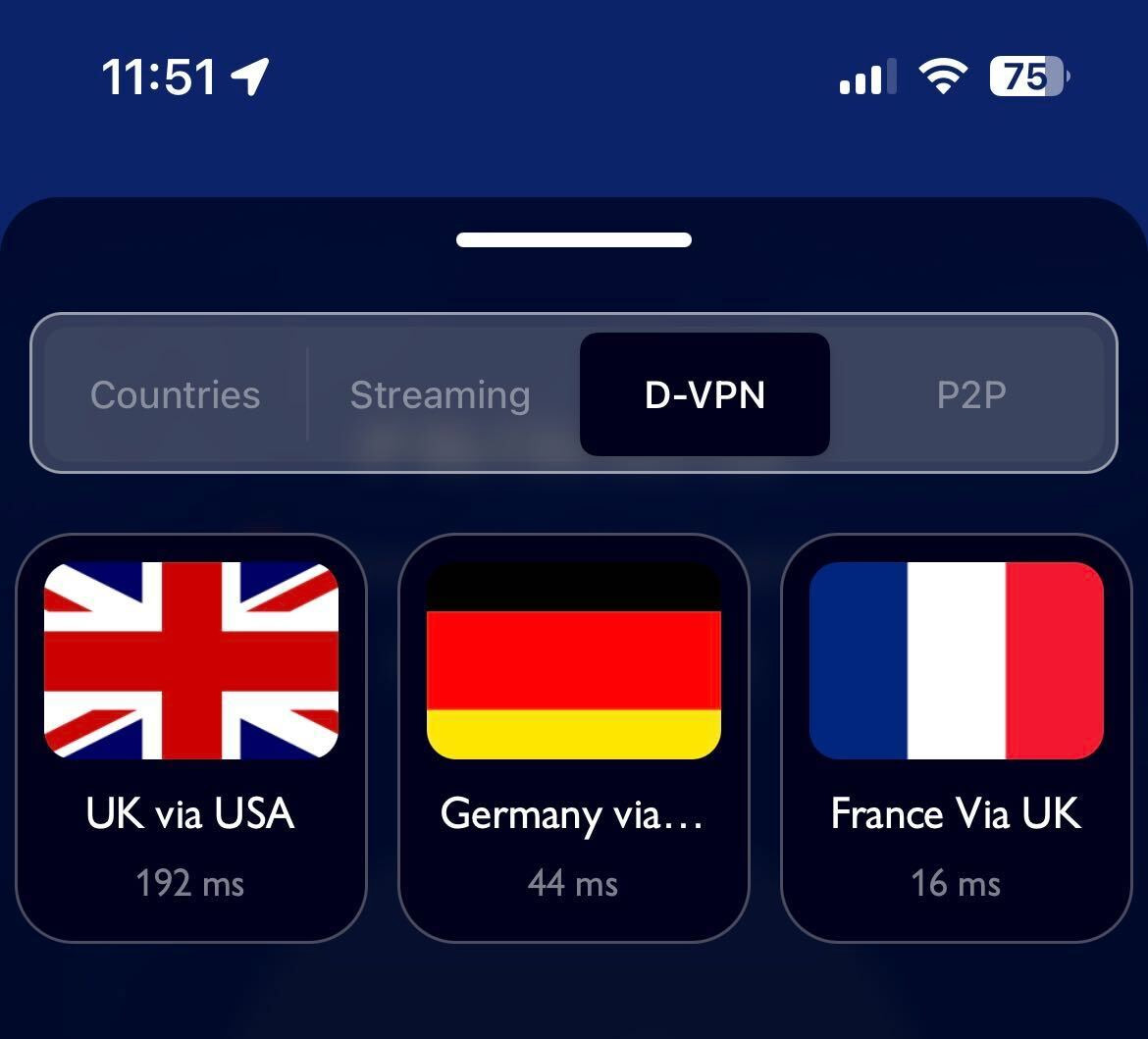
Jim Martin / Foundry
To see individual servers within a country, you have to tap and hold, which isn’t a familiar gesture to iPhone users. Then, you do the same on a specific server to add it as a favourite.
Weirdly, the list of Favorite servers is on the Account screen, but you can also find it at the bottom of the main servers screen.
One positive thing about the iPhone app is that live chat support is built in and – unlike last time we tried it – it actually works now so you can speak to a representative from within the app. The only snag with this is that you can’t go back to the app to check anything while the chat is open: tap the Close button and your chat is ended.
Privacy & security
Registered in the Cayman Islands for its favourable privacy laws, FastestVPN’s privacy policy states “We do not store your logs in anyway. Any information or logs related to your browsing history – the websites you visit, the content you download or stream, your traffic destinations, or your DNS queries – stays with you and you alone.”
So, this is a no-logs VPN, which is what you’d expect.
And there’s great news: the service has now been independently audited to prove that it isn’t logging your activity or any other data. The report is available only to subscribers, which is a shame, but does confirm that, at the time when the audit was carried out, FastestVPN was not logging the data it says it doesn’t log.
The important part of the report states this: “On the dates of our review, Altius IT did not find any evidence of system configurations and/or system/service log files that, independently or collectively, could lead to identifying a specific person and/or the person’s activity when using FastestVPN service.”
FastestVPN doesn’t offer any details about whether its servers are rented, nor how they are configured. However, the company did tell us that its servers run in RAM only, like NordVPN and Surfshark’s.
Performance
One big missing feature when we last tested FastestVPN was support for WireGuard. It has now rolled this out, and some of its servers have been upgraded to 10Gbps uplinks. So, naturally, we wanted to see if this had made any difference.
Below you can see the results from those tests, which were carried out on a Gigabit fibre connection in San Francisco, with the same speeds available for uploads as well as downloads. Clockwise from top-left the locations are New York, Tokyo, Sydney and London.
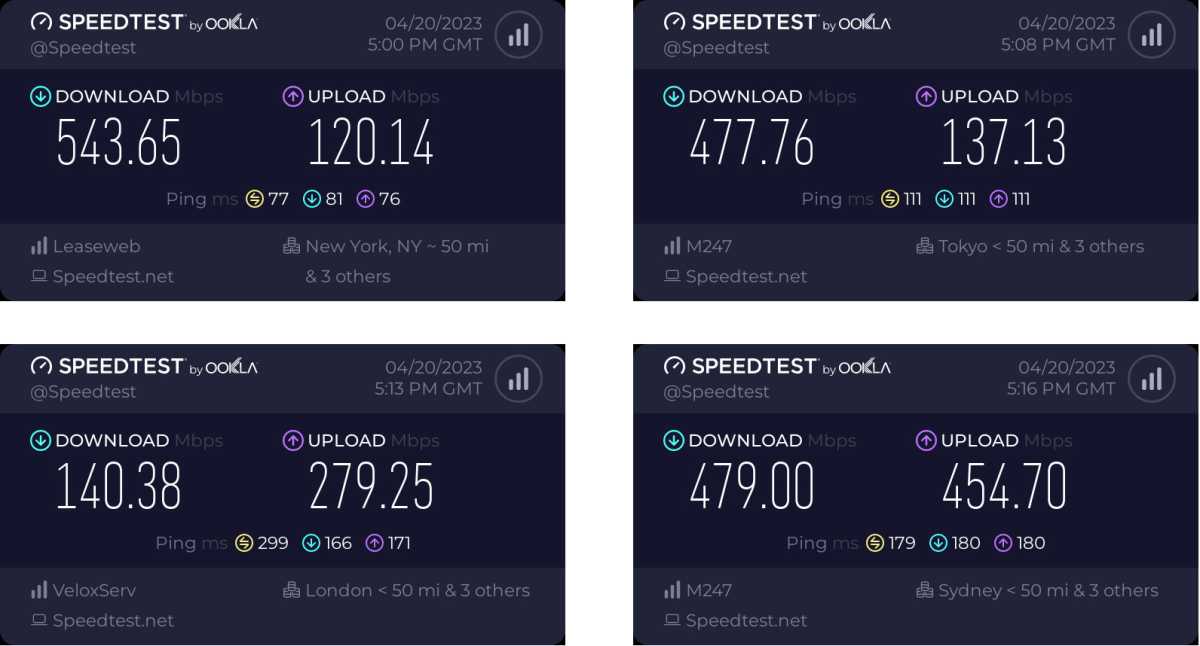
Jim Martin / Foundry
Surprisingly, the fastest speeds came from the Sydney server where upload and download speeds were both over 450Mbps. The highest speed was almost 550Mbps from the New York server, and the lowest from London at just 140Mbps.
That’s actually slower than when we first tested FastestVPN (in March 2022) where we saw around 200-240Mbps for download speeds (but only 25-45Mbps for upload using IKEv2 in the Windows app).
You have to bear in mind that speeds vary all the time, but we did run these tests multiple times and saw similar figures.
However, to put these speeds in perspective, we saw over 500Mbps from the LA server and almost 50Mbps upload a year ago using IKEv2 (below, bottom right). And, overall FastestVPN – sadly – doesn’t live up to its name. There are a good number of faster VPN services, including NordVPN and Surfshark.
Connecting to London – at almost 8pm GMT, the same time we ran the tests in March – saw speeds of just 31Mbps down and 14Mbps up.
Oddly, a server in Tokyo provided much faster download speeds of 145Mbps, but that was about 100Mbps less than we got before.
It turned out that these were achieved using OpenVPN, which is usually faster than IKEv2. But not in FastestVPN’s implementation.
That said, those speeds are much faster than the 9-15Mbps downloads we saw back in March.
IKEv2 speeds have improved too, with over 500Mbps on the LA server and almost 50Mbps upload. That’s good, but it’s still way less than the 900Mbps connection we were using to test with, and that’s in both directions, up as well as down.
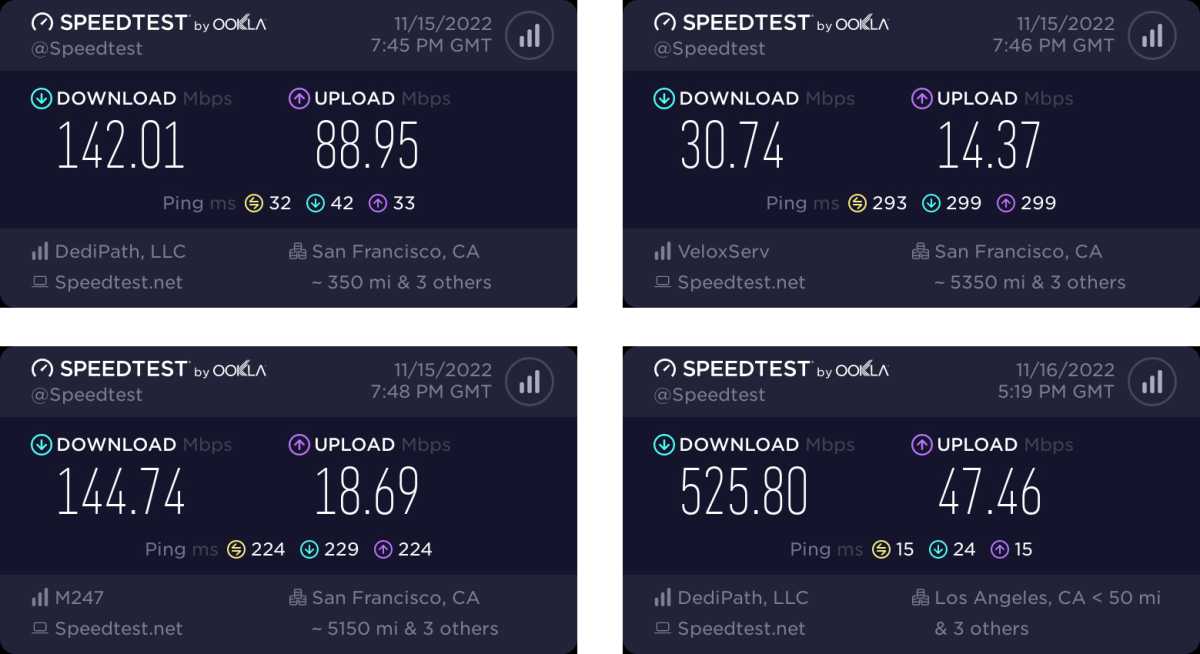
Jim Martin / Foundry
There’s good news in that, once again, we found no IP or DNS leaks, and since there is still no IPv6 support, those connections are simply blocked, and they were in our tests.
One potential issue we discovered while testing the kill switch in the Windows app was that our real IP address was briefly visible for a second or two before the kill switch kicked in and blocked internet access. This happened when manually disconnecting from a VPN server, though, and shouldn’t be a major issue for most people.
Unblocking
Unblocking content used to be a real weak point. However, the selection of streaming servers has solved this.
We connected to the UK Streaming server from France and had no issues watching BBC iPlayer or ITVX, which was refreshing.
From the UK, we also tested the US Streaming server and found that it similarly unblocked Disney+ and Netflix and allowed us to watch NCIS and other US exclusives.
The company says that it will also unblock Hotstar, which we didn’t test.
Since there’s no streaming server for Australia, you won’t be watching 9Now from any other country. It’s also worth remembering that only seven countries are covered. So if you wanted to unblock Neflix’s French library to watch something exclusive on there (such as the latest season of Miraculous), you won’t be able to.
Price & plans
We’ve already talked about how much FastestVPN costs, and it’s hard to imagine anyone would decide against the lifetime subscription (US$40 – around £32.50) and opt to pay annually for $25 (around £16). There’s no free trial or free tier, so the cheapest way to test the service is to sign up for a month for $7 (around £5).
You can’t pay by cryptocurrency: the options are PayPal or a credit or debit card.
There’s a 15-day money-back guarantee on all plans, which is half as long as most rivals offer. You might assume this is a way to try out the service for free, but it isn’t difficult to find unhappy people who have posted online to say that they were unable to get a refund when they requested one.
The subscription allows you to have 10 devices connected at the same time. And in the unlikely event you need more, you can add more for $4 each, and you can do this later on from your account dashboard.
Verdict
Although the price has doubled, $40 is still a bargain for lifetime access to a VPN that offers decent speeds, unblocks popular streaming services and has an audited no-logs policy.
And for anyone who already took out a lifetime subscription for $20, they can upgrade to get WireGuard and access to the 10Gbps servers for streaming, double VPN and P2P. It might seem a bit unfair to have to pay again, but you can choose not to and continue to get the same service and features as before.
It’s good to see that the service has been improved since we last tested it and, if you’re happy with the speeds on offer, it is a decent option for those who want an audited no-logs VPN at a rock-bottom price.
There are still plenty of signs that this is a ‘cheap’ VPN, though, from the limited number of servers to the somewhat clunky apps. We’d hesitate to trust the kill switch fully to keep our IP address firmly under wraps and you’ll find more features – particularly on Windows – in a lot of rival VPNs.
However, again, FastestVPN ticks a lot of the important boxes. So long as you don’t want to watch one of the more obscure streaming services (such as Australia’s 9Now that we already mentioned), FastestVPN is good value.






